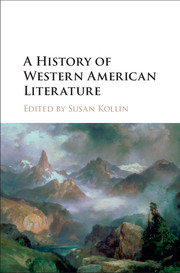Book contents
- Frontmatter
- Contents
- Notes on Contributors
- Acknowledgments
- Introduction: Historicizing the American Literary West
- PART I HOMELANDS
- PART II MAKING A REGION
- PART III GEOGRAPHIES OF THE LITERARY WEST
- PART IV THE TWENTIETH CENTURY AND BEYOND: LITERARY MOVEMENTS AND CRITICAL PERSPECTIVES
- Selected Bibliography
- Index
Introduction: Historicizing the American Literary West
Published online by Cambridge University Press: 05 November 2015
- Frontmatter
- Contents
- Notes on Contributors
- Acknowledgments
- Introduction: Historicizing the American Literary West
- PART I HOMELANDS
- PART II MAKING A REGION
- PART III GEOGRAPHIES OF THE LITERARY WEST
- PART IV THE TWENTIETH CENTURY AND BEYOND: LITERARY MOVEMENTS AND CRITICAL PERSPECTIVES
- Selected Bibliography
- Index
Summary
The project of historicizing the American literary West and the production of regions themselves has been enormously and productively complicated by recent scholarly developments. With diaspora studies, borderlands scholarship, comparative Indigenous approaches, Pacific Rim studies, transnational feminisms, settler colonial theory, and critical regionalism opening up important new archives, literary historians are developing more complex methods and nuanced accounts of the American West. Likewise, as cultural and literary production associated with the West circulates transnationally and unevenly under the pressures of globalization, many of these regional texts accrue new audiences as well as diverse and often contested meanings. In her memoirs Funny in Farsi and Laughing without an Accent, for instance, Firoozeh Dumas takes on the genre of the popular western, noting changes in its reception across literary history and geographical contexts in ways that highlight the challenges facing regional studies. Describing her coming of age in California in the late 1970s and 1980s as the child of Iranian immigrants, the author often focuses on her father's life in recounting her experiences of cultural dislocation, regional identity, and the struggle for national belonging. At one point, Dumas recalls his childhood in Iran, noting how much her father loved watching movies. “Had it been up to him, he would have happily spent his entire childhood in front of the big screen, dreaming his life away,” she writes. “His favorites were the American westerns, where the good guys always won.”
Looking back on her California childhood, the author mostly remembers the kindness she received from her neighbors, but at one point tells of drastic changes that occurred after the Iranian Revolution. “It all started in 1979,” Dumas writes. “It seemed like on Monday, everyone was asking us if our carpets really do fly. Then on Friday, those same people were putting ‘I Play Cowboys and Iranians’ bumper stickers on their cars.” While her father may have aligned himself with the good guys featured in the westerns he enjoyed in Iran, the subject position he claimed for himself would be challenged by responses to international events unfolding in the late 1970s. U.S. orientalist discourse, which often portrayed Iranians as intriguing exotic Others hailing from the land of Persia, dramatically shifted in the wake of the Iranian Revolution and the American hostage crisis.
- Type
- Chapter
- Information
- A History of Western American Literature , pp. 1 - 12Publisher: Cambridge University PressPrint publication year: 2015

